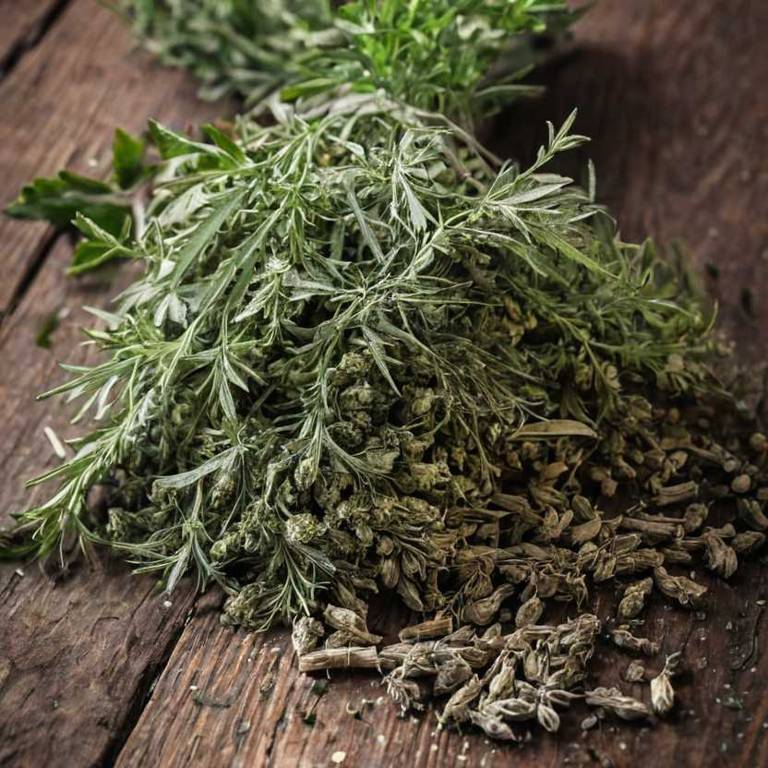By Leen Randell
Updated: Jul 21, 2024
10 Possible Side Effects Of Artemisia Annua (Sweet Annie)

Artemisia annua has some side effects when used improperly, such as gastrointestinal issues, allergic reactions, and liver damage.
These side effects can be caused by high doses, prolonged use, or interactions with other medications.
For instance, severe stomach pain, nausea, and diarrhea can make it difficult for individuals to maintain their daily routines and overall health, while allergic reactions can lead to respiratory problems and anaphylaxis, potentially life-threatening situations.
This article explains in details the 10 most common side effects of Artemisia annua if used imporperly.
1. Lowers blood sugar levels
2. Lowers blood sugar levels
Artemisia annua triggers asthma attacks due to its potent allergenic and irritating properties.
The plant contains a high concentration of sesquiterpenes, which can cause respiratory issues in individuals with pre-existing asthma conditions.
Additionally, the pollen and other particles released by the plant can exacerbate allergies and trigger asthma symptoms such as wheezing, coughing, and shortness of breath.
3. Lowers blood sugar levels
Artemisia annua increases bleeding risk by inhibiting platelet aggregation and reducing platelet count.
This is due to the presence of artemisinin, a sesquiterpene lactone that interacts with platelets, disrupting their ability to form clots.
As a result, people using Artemisia annua may experience an increased risk of bleeding, particularly if they are already taking anticoagulant medications or have a pre-existing bleeding disorder.
4. Lowers blood sugar levels
Artemisia annua interacts with warfarin.
When used together, this combination may lead to an increase in the risk of bleeding due to its ability to enhance the effect of warfarin on platelet function and liver metabolism.
The sesquiterpenoids present in Artemisia annua, particularly artemisinin, are believed to be responsible for this interaction by inhibiting cytochrome P450 enzymes and increasing the bioavailability of warfarin.
5. Lowers blood sugar levels
Artemisia annua reduces blood pressure due to its ability to relax blood vessels and decrease peripheral resistance.
The herb's active compound, artemisinin, can cause a reduction in blood pressure by blocking the action of calcium ions on smooth muscle cells, leading to vasodilation.
Additionally, Artemisia annua may also increase nitric oxide production, which can further contribute to its hypotensive effects.
6. Lowers blood sugar levels
7. Lowers blood sugar levels
Artemisia annua activates uterine contractions due to its ability to stimulate the contraction of smooth muscle cells in the uterus.
This is attributed to the presence of certain compounds such as artemisinin and flavonoids, which have been shown to increase uterine tone and enhance contractility.
As a result, Artemisia annua may exacerbate pre-existing conditions such as uterine fibroids or endometriosis, and potentially induce labor in pregnant women.
8. Lowers blood sugar levels
Artemisia annua enhances sedative effects due to its ability to bind to central nervous system receptors, particularly GABA receptors.
This binding action can increase the levels of the inhibitory neurotransmitter GABA, leading to a calming and sedating effect on the body.
As a result, users may experience increased feelings of relaxation, reduced anxiety, and potentially even sleepiness.
9. Lowers blood sugar levels
Artemisia annua slows down metabolism by interfering with the body's ability to digest and process food.
This is due to its high content of sesquiterpenoids, which can bind to and inhibit the activity of enzymes involved in glucose and lipid metabolism.
Additionally, Artemisia annua has been shown to increase the production of certain hormones that regulate appetite and satiety, leading to decreased metabolic rate and potential weight gain.
10. Lowers blood sugar levels
Artemisia annua aggravates anxiety symptoms due to its high content of artemisinin, a bioactive compound that can affect the brain's neurotransmitters.
The stimulating properties of this compound may cause an increase in heart rate and blood pressure, leading to feelings of panic, jitteriness, and heightened stress levels.
This reaction is often linked to an overactivation of the body's fight-or-flight response, further exacerbating anxiety symptoms.